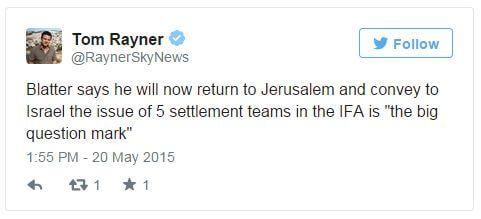Today’s Top Stories
1. FIFA chairman Sepp Blatter is visiting Jerusalem and Ramallah to defuse Palestinian efforts to kick Israel out of international soccer. Blatter reiterated his opposition to any sanctions, and even suggested a peace match. More background at the JTA and Los Angeles Times.
One particular point of friction where the Palestinians think they have the upper hand: five Israeli teams that play in settlements.
2. A Palestinian driver rammed his car into a group of Israeli police officers in eastern Jerusalem near the Mount of Olives, injuring two. YNet reports the driver was shot and killed when he tried to reverse his car over one of the injured officers.
3. Prime Minister Netanyahu suspended a controversial pilot program banning Palestinian workers from buses used by Jews in the West Bank. The move came hours after Defense Minister Moshe Yaalon approved the plan for security reasons, which prompted fierce criticism from Palestinians and Israelis alike.
4. Newsweek Mangles the Green Line: HonestReporting gets the correction after Newsweek fudges the history of the Green Line.
5. HR Radio: An Inciting Angel and Missing Trees: The New York Times doesn’t believe that Palestinian Authority President Mahmoud Abbas incites to violence, saying Israel only “claims” he does. And what happened to all those olive trees that CNN says were chopped down and “seized” by Israeli settlers? Click below to hear Yarden Frankl’s interview on the Voice of Israel.
Israel and the Palestinians
• Former British soccer executive Simon Johnson is helping Israel avoid being kicked out of FIFA. Johnson discussed the issue with the Jerusalem Post:
In the long history of FIFA, through many international political disputes, the FIFA Congress had, he believed, never voted to suspend a member association, he said.
“During the Balkan conflict, the Afghan and Iraq wars, the Somalia conflict, the civil wars in Sudan and in the current conflict between Russia and Ukraine, FIFA has kept itself above politics and has not taken steps that might favor one side or another in a political conflict.”
Johnson told FIFA and other leading international soccer authority figures that if, in those circumstances, it were to debate and vote to suspend the IFA, having not done so in respect of any other member association, FIFA would be unfairly discriminating against the State of Israel.
• Sky News looks at the history of Israeli soccer in international competition.
• The Israeli cabinet approved a five-year plan to upgrade infrastructure and archaeological activity at the Western Wall. AP coverage.
• YNet got a sneak peek at the IDF’s latest non-lethal ammunition for crowd control.
Around the World
• One year after the terror attack at the Jewish museum of Brussels, AFP looks at European Jewish fears of Islamic radicalism.
“The threat of jihadist attacks in Europe is not limited to the Jewish community,” European Jewish Congress chief Moshe Kantor told AFP.
“Islamist extremists see European democracy and freedom as their primary enemy. However, Jews remain on the frontlines,” he added . . .
He said fear is beginning to drive members of the 40,000 Jewish community to leave Belgium, adding he knows three families who will leave for Israel over the summer.

• “Unofficial” US-Israel contacts discuss boosting military aid if/when an Iranian nuclear deal is signed. According to Haaretz:
This is in light of the continued defense risk perceived coming from Iran, as well as huge arms deals between the Washington and the Gulf states. The United States is likely to provide Israel with, among other things, more F-35 combat aircraft and another battery of a missile interception system.
• Professor Robert Wistrich, the world’s foremost experts on anti-Semitism, died of a heart attack. Wistrich, who taught at Hebrew University, was in Rome to address the Italian senate on European anti-Semitism. He was 70. See obits at the Times of Israel and Jerusalem Post.
• Iranian artist goes on trial for cartoon mocking draft legislation.
Commentary/Analysis

• Worth reading: Natan Sharansky on the BDS movement’s campus efforts:
The danger of movements like BDS is not in the economic damage they could do to Israel; rather, it is in their ability to intimidate anyone who is ready to show sympathy to the Jewish state, an interest in traveling to it, or even a readiness to acknowledge his or her own Jewishness. In this environment, the majority of Jewish students very often becomes a silent majority. While it might seem encouraging, then, that on a representative campus 200 students will attend an Israel-related event organized by one of our fellows, while only 100 participate in BDS’s “Anti-Apartheid Week,” it is far less encouraging when one recalls that the same campus houses roughly 6,000 Jewish students, so many of whom simply choose not to get involved.
Many studies and focus groups have shown that even Jews who are sympathetic toward Israel and feel positively about their own Jewishness choose to be silent in order not to defy mainstream opinion, damage their career, or take up what seems to be a losing cause. To change the atmosphere, then, Israel’s sympathizers have to shift gears, from playing defense to launching a confident offense. They have to take back the banner of human rights and liberalism, and not permit this rhetoric to be misused by those who are defending some of the world’s most reactionary forces.
• President Obama’s trying to leverage “other people’s armies” to deal with Iran. David Rothkopf examines the risks and benefits of the US “letting its friends and enemies slug it out.”
At its best, it is a sound idea that recognizes the limits of American power, the often thankless, frustrating experience of being the world’s policeman, and the reasonable expectation that other nations should clean up their own messes.
But the idea is not without its own limitations. There are multiple deep risks associated with defaulting to this approach. They include the inability to influence outcomes so that they advance or protect vital U.S. interests, the problems associated with having allied armies inadequate to tackling the problem at hand trying and then failing to achieve a goal that might have been achievable with greater U.S. involvement, and the danger of being forced by expediency to support or align ourselves with bad actors, thus making matters materially worse for us and our allies.
• Here’s what else I’m reading today:
– Jonathan Schanzer: The next Gaza war that nobody wants
– Varda Muhlbauer: The BDS boomerang effect in Israel
– Arsen Ostrovsky: The not-so-new anti-Semitism in Europe
– Ron Kampeas: Will Vatican’s Palestine reference impact Jewish-Catholic ties?
– Clifford May: The summit that wasn’t
– Michael Burleigh: The BBC must go on a crash diet to survive
Featured image: CC BY-NC-SA flickr/patrickdevries2003 with additions by HonestReporting; Brussels CC BY-NC-ND flickr/Juan Rubiano; Sharansky CC BY-ND flickr/Jewish Agency for Israel;
For more, see yesterday’s Israel Daily News Stream and join the IDNS on Facebook.


